With Taiwan Semiconductor Manufacturing Co (TSMC, 台積電) pouring large funds into Arizona, the US is expected to see an improvement in its status to become the second-largest maker of advanced semiconductors in 2027, Taipei-based market researcher TrendForce Corp (集邦科技) said in a report last week.
TrendForce estimates the US would account for a 21 percent share in the global advanced integrated circuit (IC) production market by 2027, sharply up from the current 9 percent, as TSMC is investing US$65 billion to build three wafer fabs in Arizona, the report said.
TrendForce defined the advanced chipmaking processes as the 7-nanometer process or more sophisticated technologies.

Photo: I-Hwa CHENG / AFP
The 3nm process is the latest technology TSMC has launched, with mass production in Tainan, while the chipmaker is developing the more sophisticated 2nm and even 1.4nm processes.
For Taiwan, its share of advanced IC processes in the global market is expected to fall to 54 percent in 2027 from the current 71 percent, although the country would retain the number one spot in 2027, the report said.
South Korea is likely to see its market share fall to 9 percent in 2027 from the current 11 percent, with its ranking expected to fall to third place from the current second, it said.
TSMC is building two advanced fabs in Arizona.
The first is scheduled to start mass production using its 4nm process in early next year, while the second is slated to mass-produce wafers using the 3nm and 2nm processes in 2028.
The company also plans to build a third fab in Arizona using the 2nm process or more advanced technology, with production slated to start by the end of 2030.
Ray Yang (楊瑞臨), an international strategy development consulting director at the government-sponsored Industrial Technology Research Institute (ITRI, 工業技術研究院), said after US president-elect Donald Trump returns to the White House in January, the US government is expected to further push for “Made in America” initiatives by cutting business taxes and raising tariffs to build a more comprehensive semiconductor ecosystem.
According to a projection made by the Boston Consulting Group, the US would triple its domestic semiconductor manufacturing capacity in 2032 compared with 2022, when the CHIPS and Science Act went into effect.
The consulting firm also projected capital expenditure in semiconductors in the US would account for more than one-quarter, or 28 percent, of the global total between next year and 2032.

POWERING UP: PSUs for AI servers made up about 50% of Delta’s total server PSU revenue during the first three quarters of last year, the company said Power supply and electronic components maker Delta Electronics Inc (台達電) reported record-high revenue of NT$161.61 billion (US$5.11 billion) for last quarter and said it remains positive about this quarter. Last quarter’s figure was up 7.6 percent from the previous quarter and 41.51 percent higher than a year earlier, and largely in line with Yuanta Securities Investment Consulting Co’s (元大投顧) forecast of NT$160 billion. Delta’s annual revenue last year rose 31.76 percent year-on-year to NT$554.89 billion, also a record high for the company. Its strong performance reflected continued demand for high-performance power solutions and advanced liquid-cooling products used in artificial intelligence (AI) data centers,

SIZE MATTERS: TSMC started phasing out 8-inch wafer production last year, while Samsung is more aggressively retiring 8-inch capacity, TrendForce said Chipmakers are expected to raise prices of 8-inch wafers by up to 20 percent this year on concern over supply constraints as major contract chipmakers Taiwan Semiconductor Manufacturing Co (TSMC, 台積電) and Samsung Electronics Co gradually retire less advanced wafer capacity, TrendForce Corp (集邦科技) said yesterday. It is the first significant across-the-board price hike since a global semiconductor correction in 2023, the Taipei-based market researcher said in a report. Global 8-inch wafer capacity slid 0.3 percent year-on-year last year, although 8-inch wafer prices still hovered at relatively stable levels throughout the year, TrendForce said. The downward trend is expected to continue this year,

Vincent Wei led fellow Singaporean farmers around an empty Malaysian plot, laying out plans for a greenhouse and rows of leafy vegetables. What he pitched was not just space for crops, but a lifeline for growers struggling to make ends meet in a city-state with high prices and little vacant land. The future agriculture hub is part of a joint special economic zone launched last year by the two neighbors, expected to cost US$123 million and produce 10,000 tonnes of fresh produce annually. It is attracting Singaporean farmers with promises of cheaper land, labor and energy just over the border.

US actor Matthew McConaughey has filed recordings of his image and voice with US patent authorities to protect them from unauthorized usage by artificial intelligence (AI) platforms, a representative said earlier this week. Several video clips and audio recordings were registered by the commercial arm of the Just Keep Livin’ Foundation, a non-profit created by the Oscar-winning actor and his wife, Camila, according to the US Patent and Trademark Office database. Many artists are increasingly concerned about the uncontrolled use of their image via generative AI since the rollout of ChatGPT and other AI-powered tools. Several US states have adopted